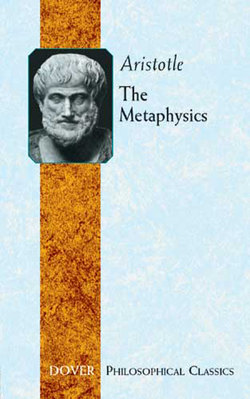Описание книги
"All men by nature are actuated with the desire of knowledge," declared Aristotle. The philosopher's works are foundational to the history of science, and his treatise on metaphysics, or «first philosophy,» is divided into sections on previous philosophical thought and theories; a refutation of skepticism; a demonstration of God's existence; an examination of the relation of metaphysics to the other sciences; an elucidation of the nature of the infinite; and other major philosophical issues.The central theme consists of an inquiry into how substance may be defined as a category of being. Aristotle defines substance as ultimate reality, since substance belongs to no other category of being, and because substance serves as the basis for every other category of being. The philosopher also defines substance as an underlying reality, or as the substratum of all existing things. He describes substance as both formal and material reality, and he discusses the relation between potentiality and actuality. An excellent example of Aristotle's dialectical method, which reasons from reliable opinions rather than known truths, this work offers a fine introduction to classical metaphysics.
